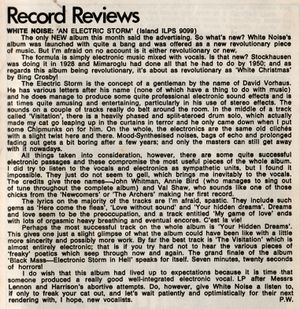DD154918
From WikiDelia
Jump to navigationJump to searchDD154918 is a scathing review of An Electric Storm published in TIME OUT in London magazine in the Sept.27 - Oct.11 issue (presumably 1968), page 41.
Slamming the brilliant album on every conceivable point, it is clearly written by someone either with serious mental problems, unable to control some personal grudge or with an overpowering interest in reducing the album's sales and impact.
“The only NEW album this month” refers to White Noise's advert in the same issue: see DD154941.
There is a high-definition scan of it in the Medialink library.
Transcript
WHITE NOISE: ‘AN ELECTRIC STORM’ (Island ILPS 9099) The only NEW album this month said the advertising. So what's new? White Noise's album was launches with wuite a bang and was offered as a new revolutionary piece of music. But I'm afraid on no account is it either revolutionary or new. The formula is simply electronic music mixed with vocals. Is that new? Stockhausen was doing it in 1928 and Mimaroglu had done all that he had to do by 1950; and as regards this album being revolutionary, it's about as revolutionary as ‘White CHristmas’ by Bing Crosby! The Electric Storm is the concept of a gentleman by the name of David Vorhaus. He has various letters after his name (none of which have a thing to do with music) and he does manage to produce some quite professional electronic sound effects and is at time quite amusing and entertaining, particularly in his use of stereo effects. The sound on a couple of tracks really do belt around the room. In the middle of a track called ‘Visitation’, there is a heavily phased and split-steroed [sic] drum solo, which actually made my cat go leaping up in the curtains in terror and he only came down when I put some Chipmunks on for him. On the whole, the electronics are the same old clich/eacute;s with a slight twist here and there. Mood-Synthesized noises, bags of echo and prolonged fading out gets a bit boring after a few years; and only the masters can still get away with it nowadays. All things taken into consideration, however, there are some quite successful electronic passages and these compromise the most useful pieces of the whole album. I did try to listen to the vocals and electronics as sympathetic units, but I found it impossible. THey just do not seem to gell, which brings me inevitably to the vocals. The credits give three names—John Whitman, Annie Bird (who manages to sing out of tune throughout the complete album) and Val Shaw, whou sounds like one of those chicks from ‘Newcomers’ or ‘The Archers’ making her first record. The lyrics on the majority of the tracks are I'm afraid, spastic. The include such gems as ‘Here come the fleas’, ‘Love without sound’ and ‘Your hidden dreams’. Dreams and love seem to be the preoccupation, and a track entitled ‘My game of love’ ends with lots of orgasmic heavy breathing and evental encores. C'est la vie! Perhaps the most successful track on the whole album is ‘Your hidden dreams’. This gives one just a slight glimpse of what the album could have been like with a little more sincerity and possibly more work. By far the best track is ‘The Visitation’ which is almost entirely electronic; that is if you try hard not to hear the various pieces of ‘freaky’ poetics which seep through now and again. The grand finale of the album ‘Black Mass—Electronic Storm in Hell’ speaks for itself. Seven minutes, twenty seconds of horrors! I do wish that this album had lived up to expectations because it is time that someone produced a really good well-integrated electronic vocal LP after Messrs Lennon and Harrison's abortive attempts. Do, however, give White Noise a listen to, if only to freak your cat out, and let's wait patiently and optimistically for their next rendering with, I hope, new vocalists. P.W.
